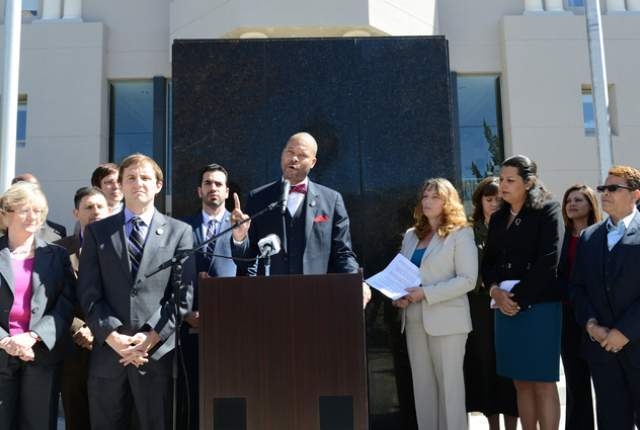Democrats unveil blueprint, but still mum on taxes
Every Nevadan deserves a fair shot at the American Dream. They should all get a quality education, a good job, a safe community and a secure retirement, if they work for it.
And who could be against that?
Those are the opening words of The Nevada Blueprint: Protecting and Expanding the Middle Class, a Democratic policy document released today by state Senate Minority Leader Aaron Ford, D-Las Vegas, and Assembly Minority Leader Marilyn Kirkpatrick, D-North Las Vegas, that sets out what Nevada’s minority Democrats want to get out of the 2015 session.
The rest of the plan will surely run into Republican opposition, with many bills unlikely to see the outside of a committee room. Items include:
• High-quality pre-kindergarten through 12th grade education.
• Fully funded, universal all-day kindergarten.
• Building new schools and hiring more qualified teachers.
• Expanded English Language Learner programs.
• Reducing student debt and establishing tax credits for education expenses.
• Open a Southern Nevada medical school at UNLV, and getting UNLV to Tier 1 status.
• Equal pay for women.
• Increase Nevada’s minimum wage.
• Make child care more affordable.
• Establish a back-to-school sales tax holiday so Nevadans can purchase clothes and supplies tax-free.
• Establish an earned sick-leave program for Nevada workers.
• Lower car-registration fees.
• Same-day voter registration.
• Oppose legislation that make it harder to sue.
• Close the loophole in state law that allows businesses to appeal and lower their property tax bills, sometimes significantly.
• Enact Kirkpatrick’s “luxury discretionary spending tax,” a reform of the current live-entertainment tax that would cover big outdoor events such as the Electric Daisy Carnival, NASCAR races and Burning Man as well as admission to Strip nightclubs.
• Exempt small businesses, especially brand-new ones, from increased taxes or fees.
POLITICS AND TAXES
Politically, this is a stake-your-ground manifesto, something Democrats can point to during the 2016 elections to show they stood up for an ambitious progressive agenda, even if majority Republicans didn’t allow that agenda to progress very far. They can still say they stood up and worked hard for their priorities, and ask voters dispirited in 2014 to give them another look come 2016.
Practically, there are still some problems. How, for example, will we be paying for all of the things listed in the blueprint, especially after we lower car-registration fees, exempt small businesses from increased taxes and fees and give out tax credits for college?
That’s not entirely clear.
“Governor [Brian] Sandoval’s proposal is a welcome starting point for the conversation about a new revenue structure for Nevada. We agree with the governor that we must hold our largest and most stable corporations accountable for doing business in our state,” the plan reads.
But shortly thereafter, it adds this: “To create an environment in which our small businesses can prosper, we must minimize the obstacles to starting a new business or growing an existing one. One way to do this is by exempting small businesses, especially brand-new ones, from increased taxes or fees. Doubling fees for a small business will lead to fewer people creating businesses and fewer good-paying jobs.”
That’s funny because Sandoval’s “welcome starting point for the conversation” on taxes doubles fees for a small business! (Granted, the increase is from just $200 to $400, but still.) Could Democrats be hinting that the governor’s plan should be adjusted so that larger businesses pay more, and smaller businesses pay less? Maybe so, because the next line says this:
“As legislative Democrats review different revenue proposals this session, we will continually look for ways to ensure that big corporations pay their fair share so that the burden is not placed on middle-class families and small businesses.”
TO WAIT OR NOT TO WAIT?
If you were hoping Democrats would endorse a specific plan today, you were disappointed. And while I’ve argued Democrats should consider embracing Sandoval’s plan, others have suggested they should keep quiet until the details of Sandoval’s plan are unveiled this week and next.
My colleague Jon Ralston said so in his email newsletter today, in fact: “There is no GOP plan, only the Sandoval plan,” Ralston wrote. “Doesn’t it make more sense to listen to all of the testimony and then embrace one or present an alternative? There hasn’t been one hearing yet on the governor’s plan. Shouldn’t the Democrats wait for that before endorsing or proposing anything? You know, like the reflexive GOP Ass. Caucus did not?”
But given that Sandoval is the governor, and titular head of the party, and given that the leaders in both Senate and Assembly have indicated their support (or at least not overt hostility) to his idea, isn’t the governor’s plan the de facto Republican plan? (Of course I mean the Republicans who have not forsworn taxes in a blood oath and thus removed themselves from the conversation entirely.)
And what does waiting achieve, when we all know one central fact: There are very few tax alternatives that Democrats can embrace that would both a.) fund the budget and b.) get through the Republican-controlled Legislature. (Hell’s bells, Sandoval’s plan is going to have a tough time getting through the Republican-controlled Legislature!) Which means, whether now or after the hearings on the governor’s plan scheduled for next week, Sandoval’s idea is undoubtedly the best, most viable vehicle to achieve a decades-long Democratic priority: establishing a business revenue tax and increasing education funding.
It may not hurt the Democrats to wait, and keep their options open, as their Blueprint clearly does. But we all know where this will end up, and that’s a place very close to where we stand right now.






















